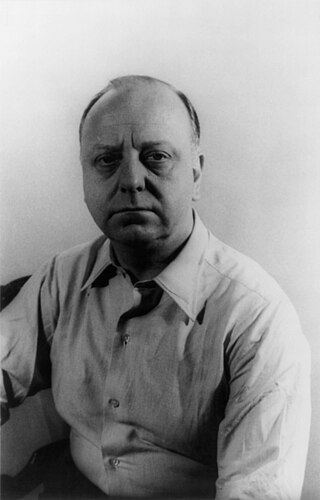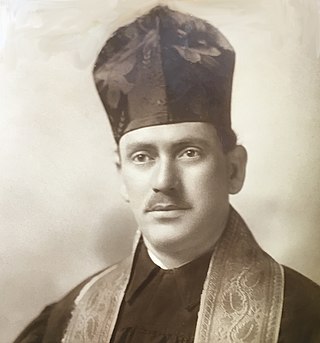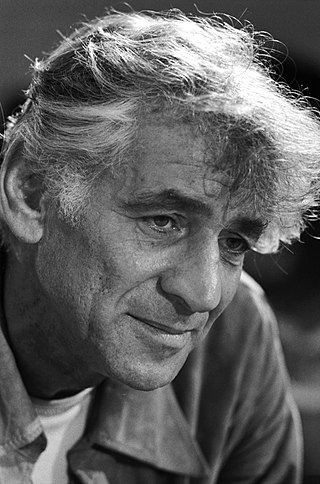
Virgil Thomson was an American composer and critic. He was instrumental in the development of the "American Sound" in classical music. He has been described as a modernist, a neoromantic, a neoclassicist, and a composer of "an Olympian blend of humanity and detachment" whose "expressive voice was always carefully muted" until his late opera Lord Byron which, in contrast to all his previous work, exhibited an emotional content that rises to "moments of real passion".
Benjamin Lees was an American composer of classical music.

Chichester Psalms is an extended choral composition in three movements by Leonard Bernstein for boy treble or countertenor, choir and orchestra. The text was arranged by the composer from the Book of Psalms in the original Hebrew. Part 1 uses Psalms 100 and 108, Part 2 uses 2 and 23, and Part 3 uses 131 and 133. Bernstein scored the work for a reduced orchestra, but also made a version for an even smaller ensemble of organ, one harp, and percussion.

Berthold Goldschmidt was a German Jewish composer who spent most of his life in England. The suppression of his work by Nazi Germany, as well as the disdain with which many Modernist critics elsewhere dismissed his "anachronistic" lyricism, stranded the composer in the wilderness for many years before he was given a revival in his final decade.

Symphony No. 3 "Kaddish" is a programmatic choral symphony by Leonard Bernstein, published in 1963. It is a dramatic work written for a large orchestra, a full choir, a boys' choir, a soprano soloist and a narrator. "Kaddish" refers to the Jewish prayer that is chanted at every synagogue service for the dead but never mentions "death."
Jack Hamilton Beeson was an American composer. He was known particularly for his operas, the best known of which are Lizzie Borden, Hello Out There!, and The Sweet Bye and Bye.

Psalm 148 is the 148th psalm of the Book of Psalms, beginning in English in the King James Version: "Praise ye the Lord from the heavens". In Latin, it is known as "Laudate Dominum de caelis". The psalm is one of the Laudate psalms. Old Testament scholars have also classified it as a creation psalm and a wisdom psalm.

Barry Ernest Conyngham,, is an Australian composer and academic. He has over seventy published works and over thirty recordings featuring his compositions, and his works have been premiered or performed in Australia, Japan, North and South America, the United Kingdom and Europe. His output is largely for orchestra, ensemble or dramatic forces. He is an Emeritus Professor of both the University of Wollongong and Southern Cross University. He is former Dean of the Faculty of the Fine Arts and Music at the University of Melbourne.
Hashkiveinu is a work for solo cantor (tenor), mixed chorus, and organ composed by Leonard Bernstein in 1945. The work is six minutes in length and uses the prayer text from the Jewish Sabbath evening service. The work is in Hebrew, and the transliterated score uses Ashkenazic pronunciation.

Leonard Bernstein's Piano Trio for piano, violin, and cello was written in 1937 while he was attending Harvard University as a student of Walter Piston. He was influenced by the conductor Dmitri Mitropoulos. Several melodic ideas were recycled for use in later pieces. For example, the opening of the second movement was used later by Bernstein in his first musical, On the Town.
Jacob Weinberg was a Russian-born American Jewish composer and pianist who composed over 135 works for piano and other instruments. He was one of the founders of the Jewish National Conservatory in Jerusalem before immigrating to the U.S. where he became "an influential voice in the promotion of American Jewish music" from the 1940s until his death.

Izso G. Glickstein was a naturalized American cantor (hazzan). Glickstein was born on September 20, 1889, in Chișinău, Moldova and died on April 17, 1947, in Roxbury, Massachusetts. He was a fourth-generation, world-class chazzan and one of the "leading Jewish singers in America ranking with Cantor Josef "Yossele" Rosenblatt and others of equal prominence." He served as Chief Cantor at multiple synagogues including Europe's largest and Leonard Bernstein's childhood synagogue in Roxbury, Massachusetts. He hosted a weekly radio program on Boston's WORL and was heard often on WNAC to popularize Hebrew music. Izso performed hundreds of concerts, was the President of the New England's Cantor's Association, and made multiple recordings of cantorial music.

Opening Prayer is a composition for baritone and orchestra, written for the reopening of Carnegie Hall in 1986. Composer Leonard Bernstein set a Hebrew biblical benediction, which concludes a traditional morning service. He derived the music from an earlier piano composition, and later included it in his Jubilee Games in 1988, and in their expansion to the Concerto for Orchestra in 1989, calling the movement now Benediction.

I Hate Music: A cycle of Five Kid Songs for Soprano and Piano is a song cycle by Leonard Bernstein. Composed in 1942, the work was premiered by vocalist Jennie Tourel with Bernstein as pianist in 1943. The song has remained a part of the song repertoire and has been recorded by numerous artists; including singers Blanche Thebom, Barbara Bonney, Harolyn Blackwell and Roberta Alexander among others.

La Bonne Cuisine: Four Recipes for Voice and Piano is a 1947 song cycle of recipes by Leonard Bernstein.
Music for the Dance No. 2 is a composition for piano by American composer Leonard Bernstein. It was finished in 1938.
The Piano Sonata, originally entitled Sonata for the Piano, is the only piano sonata by American composer Leonard Bernstein. An early work by the composer, it was finished in 1938.
Four Sabras is a short composition for solo piano by American composer Leonard Bernstein. Each Sabra refers to vignettes or portraits of different fictitious Israeli children.










